What drew me to the Colonial Williamsburg Foundation (CWF) is its vision for the future. So that the future may learn from the past, the CWF wants to build on its impressive reputation and deeds as a museum to lead in digital and virtual experiences that help people all over the world, as well as across the United States, better understand early American history and how that history is integral to the present we inhabit and experience today.
New Job, New Opportunities at the Omohundro Institute
I’m excited to announce that I’ve joined the staff at the Omohundro Institute of Early American History and Culture as its new Digital Projects Editor. This is a really exciting opportunity because it means long-term support for Ben Franklin’s World and the Doing History series and a chance to continue working and collaborating with the OI’s great staff of talented historians and professionals.
Over the last two years, the team at the Omohundro Institute has helped develop Ben Franklin’s World into a serious and professional media outlet for scholarly history. Their knowledge has played a major role in growing Ben Franklin’s World into a podcast that receives over 160,000 downloads per month and has garnered more than 2 million downloads in less than 3 years. Plus, the Doing History series has evolved into a dynamic series that not only shows the world how historians work and why our work matters, but encourages us to experiment with adapting our traditional modes of historical interpretation and communication to new media. (Thus far these experiments have proven successful as episodes in the Doing History: To the Revolution! series are the most downloaded episodes in the entire BFWorld catalog.)
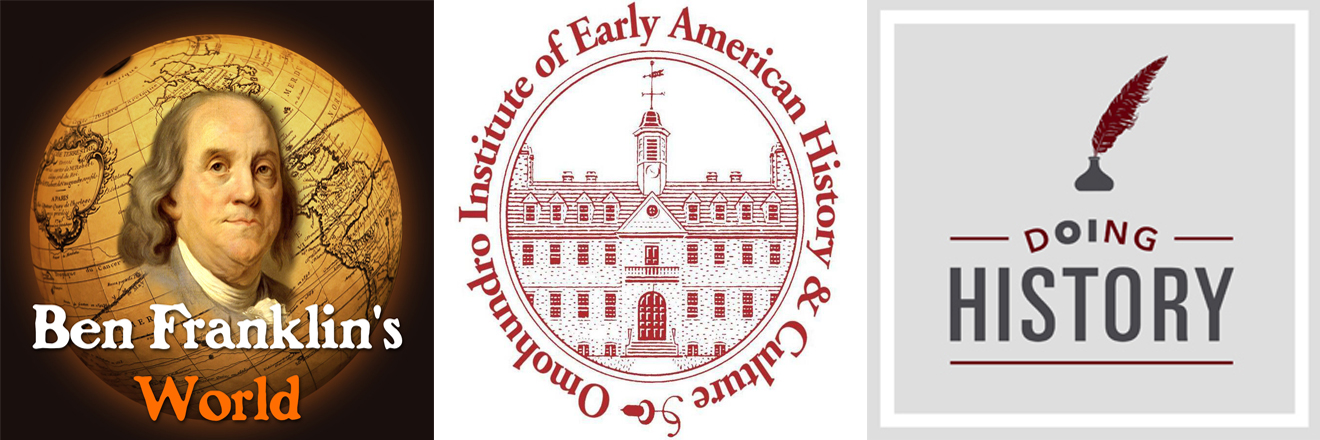
It’s also an exciting opportunity because the Omohundro Institute is the preeminent organization in the world for early American historical scholarship. They do so much to support the work that we historians do through their fellowship and publication programs, conferences, and digital history initiatives and by challenging themselves and others to produce the best scholarship in the field. And now, Ben Franklin’s World and I get to be a BIGGER part of that work.
Going forward, listeners can still expect great interviews with scholars who work on different aspects of early American History. Episodes will continue to post on Tuesdays, just as they have been for over two and a half years, and listeners can also expect more multi-part series with narrative-style episodes.
For nearly 75 years, the Omohundro Institute has been committed to producing the best scholarship in early American history and I’m really looking forward to meeting the challenge of producing episodes that meet their high standards as well as the high standards the Ben Franklin’s World and Doing History audiences have come to expect. I’m excited to contribute to the Omohundro Institute’s long tradition of excellence.
How to Start a Podcast in Grad School: A Primer
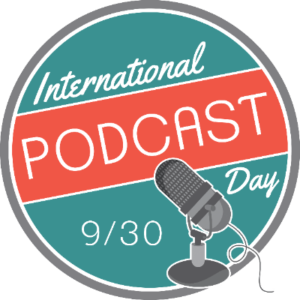 September 30th marks International Podcast Day.
In honor of this day designed to increase awareness about podcasts and podcasting, I offer this overview about how a historian might start a podcast while in graduate school.
September 30th marks International Podcast Day.
In honor of this day designed to increase awareness about podcasts and podcasting, I offer this overview about how a historian might start a podcast while in graduate school.
The Behind-the-Scenes Work
Podcasting is a lot of work.
Each episode of Ben Franklin's World represents somewhere between 40 and 60 hours of work. That work includes researching a guest, scheduling an interview, preparing for the interview, conducting the interview, editing the episode, drafting and recording intros and outros, drafting and posting show notes, creating custom graphics, and promoting the episode on its release day.
This does not count the time my audio engineer spends working on each episode nor the time I spend working on the website, troubleshooting tech hiccups, interacting with listeners, creating supplements for some episodes, or developing presentations about the podcast and podcasting for different conferences and talks.
None of the above is meant as a complaint. I love what I do.
Instead, the above overview is meant to underscore the fact that podcasting is a TON of work. Truthfully, I can't imagine trying to podcast and do it well while in graduate school.
With that said, some of you want to attempt to podcast while in grad school. So I've stretched my imagination to craft this primer to give you ideas about how you might produce a quality podcast and write a dissertation.
First, a note of caution.
Many graduate students wish to podcast because they believe it will set them apart on the job market. I do believe it could set you apart. I also believe producing a podcast could hurt your chances on the job market.
If you take too long to finish your dissertation, you will run into funding problems and some hiring committees might look unfavorably upon the extra time you took to finish your degree. Hiring committee members might also take the time to listen to your podcast. A low-quality podcast could reflect poorly upon you even if you have high-quality written work.
Time to degree and the quality of your digital scholarship matters.
6 Steps to Creating a Podcast While in Graduate School
Step 1: Careful Consideration
Before you produce a podcast you need to consider 4 components:
1. Topic
What period or aspect of history will your podcast explore and investigate?
It's important to pick a period and aspect of history that you could talk about all day. The more narrow you can go in your topical focus, the better because topic specificity will enable you to find members of your target audience faster.
The most successful podcasts tend to have very narrow focuses or "niches" (the industry term for topic).
Ben Franklin's World is odd in that it has a broad "niche" and it's successful. Two years ago, I could get away with framing my podcast around what is known as "vast early America" because there was only one other podcast about early American history and it had a different format and a more haphazard release schedule than BFWorld.
If I started a podcast today, I would have to think more narrowly. I might podcast on the American Revolution or perhaps on the American Revolution in the northeast. The latter may sound like a very narrow topic, but local history is so hot right now and that topic would work.
2. Audience
Who is your ideal listener or podcast avatar?
My podcast avatar is the fictional Janet Watkins. She's a 22-year-old pre-med student at SUNY-Buffalo and she's a woman of color. Janet hates history because her teachers have always linked history to dead, white men and have never related how history informs her present day.
My goal with each episode is to make Janet care about the early American past.
3. Format
What kind of podcast will you produce?
Will you conduct interviews? Will you produce short, solo episodes? Will you present scripted, narrative stories?
You need to consider how you will discuss and present the topic you have chosen for your podcast before you start podcasting. Research indicates that listeners like regularity. They want to be able to depend on a consistent release schedule and a mostly consistent format. This doesn't mean you can't offer both interviews and solo episodes, but you should pick one format to predominate.
4. Release Schedule
Consistency and frequency matter.
The best performing podcasts release on a consistent basis.
Time is our most precious resource and listeners invest time into listening to our podcasts. Podcast listeners tend to be loyal to their favorite shows and they want their favorite shows to be loyal to them. Being loyal to your listeners means not just producing high-quality content, it means producing it on a regular schedule listeners can depend on.
If I were in graduate school, I would create a series-based podcast. I would casually research and plot episodes during the school year, produce episodes during the less hectic summer period, and release episodes over a set number of weeks during the school year. As my episodes aired, I would start the casual research and plotting process over so I could release new episodes again the following fall.
I strongly recommend you refrain from attempting to produce a weekly or bi-weekly show while you are in graduate school. The production pace of a weekly or bi-weekly show is grueling and unrelenting.
Step 2: Create a Budget
Podcasts are free to consume, they are not free to produce.
At minimum you will need to invest in a good hosting service for your audio files. I recommend Libsyn.
Before you start podcasting decide how much money you are willing to spend to both get your podcast up and running and on monthly expenses such as audio hosting, website hosting, and editing services.
The more you get into podcasting the more money you will want to spend to upgrade your equipment and invest in new apps and software. Know how much you can and are willing to spend at the start.
Step 3: Invest in a Good Mic
Audio quality matters.
If you want people to listen to your ideas and what you are saying, you need to invest in a good mic that will allow you to present your ideas clearly.
Many podcasters use the Audio-Technica ATR2100, USB microphone. It's about $80 from Amazon and it occasionally goes on sale for around $50. This is a high-quality, versatile mic.
I record on a Heil-PR40. I purchased a kit wholesale from Broadcast Supply Warehouse for about $400. To that kit I added a Scarlet 2i2 USB mixer ($149) so I could connect my mic to my computer.
The Heil-PR40 is a fire-end microphone, which means if you set your gain right, it will catch only the noise directed into the end of the mic.
Not everyone will sound good on the same microphone. My friend Natalie Eckdahl (BizChix Podcast) records using a Heil-PR30 because she found the PR-40 deepened her voice.
The best course of action when buying a microphone is to go to a Guitar Center or a local music shop that sells mics and try them out. Then you can hear which mics make you sound great.
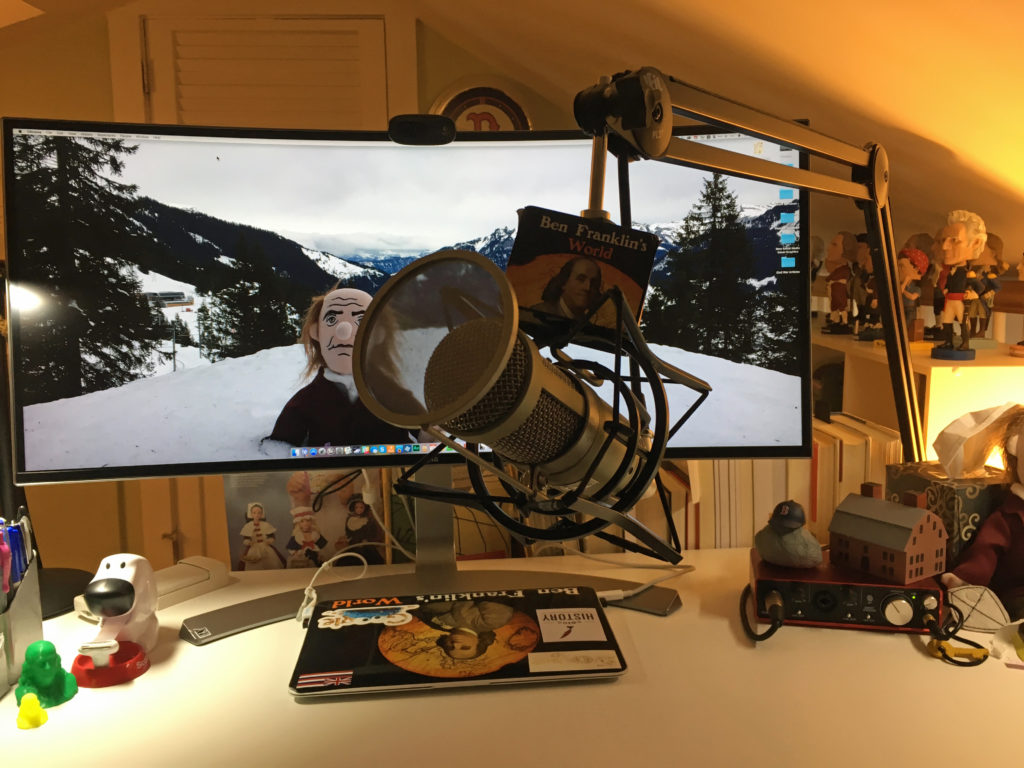
Step 4: Learn How to Use Editing Software
The quality of your content matters.
If you want listeners to take time to listen to you, you need to invest time in producing something worth listening to. You need to invest time into editing your show.
Ben Franklin's World is on the highly-produced end of the podcast spectrum. I remove "ahs," "ums," breath sounds, and extraneous speech from recordings. I also repair (when possible) drops and blips in waveforms and I make content edits.
When I listen to raw recordings, I listen not just for everything I mentioned above, I also listen to the flow and pace of the conversation. I take out extraneous rambling, tangential information that adds nothing to the points my guests are trying to make, and I sometimes re-order questions and answers to improve the flow of the conversation.
After I'm done, I send the edited files to Darrell Darnell, my assistant editor and audio engineer, so he can edit the file again and use his software to make each episode sound as good as possible.
Editing is a lot like writing. It's hard work, but fairly easy to do if you have the right tools. I started editing with a single-track editor called Fission. Today, I use a multi-track editor called Adobe Audition.
Many podcasters use Audacity, which is free. Some use Garageband. NPR uses ProTools.
Regardless of what audio software you use, take the time to learn to use it.

Step 5: Launch Your Podcast
Your job as a podcaster does not end after your edit. You must upload and promote your content.
Once you finish working on your audio file, you should tag your file with metadata. I use the ID3 Editor app. Libsyn recently added a feature to their hosting service where it will add metadata to your file after you write the description for your file.
You should list your feed with at least iTunes (the number one podcast directory), Google Play Music, and Stitcher Radio. These podcast providers are also podcast directories and they make it possible for listeners to find your show.
Once the directories list your show, promote. Promote your content on social media networks, on other podcasts, and wherever, whenever you can.
Step 6: Manage Your Expectations
Growing an audience takes time and few podcasters are ever satisfied with the size of their audience.
I've been public about the success of Ben Franklin's World, yet BFWorld and its monthly average of 68,000 downloads is an exception, not the rule.
Libsyn is the largest podcast hosting service. Each month they publish statistics for the average number of downloads a new episode receives over the course of a month (the lifespan of a new episode) and the average number of total downloads entire shows receive over the course of a month (this number includes new episodes and back catalogs).
In July 2016, an average new podcast episode received 164 downloads; the average podcast received 2,039.9 downloads.
In Summary
Podcasting is a lot of work. To do it well requires a lot of time, some money, and attention to detail. If you have the time, money, and drive it can be a very powerful way to create awareness about history.
If you are interested in learning how to podcast, tell your department head and graduate advisor. Podcasts make great tools for teaching and they could require less individual time if a department started one as a group effort. If your professors have questions about how they might start a departmental podcast, have them send me an e-mail. I have lots of ideas and a working podcast I would love to use as a teaching tool.
Digital Media and the Future of the Historical Profession
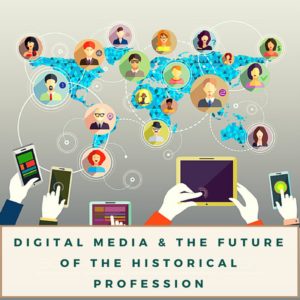 It’s August and I’ve somehow found myself with 7, straight weeks at home. It’s the first time I’ve been home for a full month this year. (Hence why this blog has been a bit of a ghost town.)
Since January, I’ve been on a type of “history podcast tour.” Historians & history lovers have become fascinated with Ben Franklin’s World and its success, and they want to know more about the show, how I produce it, and the role podcasts and other digital media will play in the future of historical scholarship. As such, I’ve spoken at a lot of conferences and sat for interviews for podcasts, blogs, and radio.
It’s August and I’ve somehow found myself with 7, straight weeks at home. It’s the first time I’ve been home for a full month this year. (Hence why this blog has been a bit of a ghost town.)
Since January, I’ve been on a type of “history podcast tour.” Historians & history lovers have become fascinated with Ben Franklin’s World and its success, and they want to know more about the show, how I produce it, and the role podcasts and other digital media will play in the future of historical scholarship. As such, I’ve spoken at a lot of conferences and sat for interviews for podcasts, blogs, and radio.
I’ve participated in a lot of conversations about podcasting, historical scholarship, and the historical profession over the last 7 months. It’s been a lot of fun and these experiences have revealed several key questions people have about these topics:
1. What is the role of podcasts and other digital media in the future of historical scholarship?
2. What has the impact of Ben Franklin’s World been on furthering historians’ ideas about history?
3. How are you making a living podcasting/what are you doing with your career?
I’ve heard these questions enough that a couple of blog posts with answers seem like a good idea. In this post, I’ll answer the first two questions. In a second post, I’ll answer “how are you making a living/what are you doing with your career?”
What is the role of podcasts and other digital media in the future of historical scholarship?
When most historians ask this question, what they really want to know is: do podcasts and digital media compete with traditional books and articles?
My answer: No.
Digital media such as podcasts, blog posts, and digital videos complement traditional history books and articles. They also complement museum exhibits and historic sites.
The 21st-century is a mobile age. We live on our smartphones and time has become our most valuable resource because our ability to connect to the internet and with people anytime, anywhere has drastically multiplied the demands on our time. This doesn’t mean that people dislike reading books or visiting museums. It means they have less time (or feel like they have less time) to devote to those activities. As a result, they want to know that they are going to enjoy something and benefit from an experience before they invest time and money into having an experience.
This is where digital media complements traditional books, articles, and exhibits. High-quality, well-researched, and well-produced scholarship is still very important and the need for it is not diminishing. However, this scholarship suffers from a discoverability problem.
For example, Barnes & Noble doesn’t stock books from most academic publishers. They sell end cap and prime sales space to big, for-profit publishers with deep pockets. What books are those big publishers putting into those visible spaces? Usually those by “Fox News Historians” and journalists with large platforms. This means that many high-quality, fascinating history books by top-notch scholars go unstocked by bookstores and unnoticed by people who would be very interested in them, if they knew they existed.
Digital media such as blog posts, podcasts, and video create awareness. They allow potential readers to know that there are great history books and articles available and where they can find them. Digital media also provides easy and convenient ways for potential readers to get a feel for the author, the history they are conveying, and the quality and depth of the historian's research before they invest time and energy into finding a particular book, or article, and reading it.
I’ve found podcasts to be the best digital media for creating broad awareness because it’s presently the perfect digital media for our mobile age. You can listen to podcasts whenever and wherever you want to, which makes them appealing and fun fillers of commuting/exercise/dog walking/cooking/cleaning/waiting time. Plus the intimacy of the medium allows listeners to feel like they have a bond with their favorite hosts and guests.
This is why listeners repeatedly tell me that I’m costing them a fortune. They buy the history books and visit the historic sites they hear about on Ben Franklin's World because they get a great preview of what they will see, learn, and of the personalities and processes of the historians who authored the books or exhibits.
My prediction for the future: Colleges and universities will create and add digital media programs to both undergraduate and graduate curriculums in academic and public history specialties. Departments will find this profitable in the sense that faculty and student-produced media will create awareness about their programs and the work of their faculty and students and in the sense that these programs will teach students tangible, technical communications skills that companies (and corporatized colleges and universities) desire.
What has the impact of Ben Franklin’s World been on furthering historians’ ideas about history?
Statistical Measurement: Downloads have risen from 288 in October 2014 to an average of almost 69,000 per month in 2016. In a survey I conducted in late 2015, 41 percent of the Ben Franklin's World audience reported that they had purchased a book or visited a historic site as a result of the show.
Objective Measurement: I receive e-mails, tweets, and Facebook messages from listeners on a daily basis that contain questions about history, topics for future shows, and that both thank me for introducing them to a book or exhibit of great interest to them and curse me because they now spend too much money on history books. Similarly, listeners reach out to show guests too. Listeners ask guests further questions about their work and attend guest talks.
Parting Thoughts
Historians should embrace rather than fear digital media. Digital media is, and will, play a big role in keeping traditional historical scholarship alive and well and in reversing the downward trend in major and course enrollment numbers. Plus, digital media offers historians new ways to practice historical scholarship. More options breed creativity and innovation, which every profession needs if it wants to stay healthy and relevant.
Teaching History Communications & Internships at Ben Franklin's World
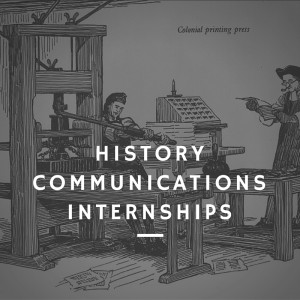 Of late, several professors have inquired whether I offer, or have considered offering, semester-long internships at Ben Franklin's World.
Their requests relate that I could teach their students valuable digital communications skills they could use in either history or non-history jobs.
Of late, several professors have inquired whether I offer, or have considered offering, semester-long internships at Ben Franklin's World.
Their requests relate that I could teach their students valuable digital communications skills they could use in either history or non-history jobs.
Teaching history communications is something I have thought about and something I may pursue in the future.
Teaching History Communications
My thoughts about how I would teach history communications come from thinking about how my involvement with Ben Franklin's World will change or end.
The podcast has been a successful history communications experiment. Within 15 months it has surpassed 500,000 downloads and become a top 8% podcast.
At the moment, I enjoy the intellectual, technical, and interpretive challenges the show offers. But it is not a project I see myself pursuing in its present form for my entire career.
I am a serial problem solver. I find a project or problem that interests me, study it, solve it, and move on to the next project or problem. At some point (I don't know when), I will move on from Ben Franklin's World to one of the other history communications project ideas I have or will have.
Knowing that I have a propensity to seek new challenges, I have started thinking about the long-term future of the podcast. I have three or four ideas about what the future might look like. With the exception of one scenario, all of the ideas involve ensuring that the podcast will continue to exist as a platform for early Americanists to communicate their work to the public.
***
One idea for Ben Franklin’s World would be to adapt the project for use as an in-classroom educational tool. This would allow me to keep tabs on the project and use it to train students in history communications. [1. I am aware of the many challenges associated with this scenario.]
I imagine a history communications course as a full-year commitment and one that is run more like a science lab than a traditional history course.
The first semester would be the equivalent of a how-to tutorial. We would discuss an interdisciplinary assortment of texts about history, writing, social media, marketing, broadcast journalism, and software and apply the ideas we discuss to podcast episodes in progress.
The second semester would be about the students taking what they have learned to develop their own history communications projects.
This course would offer a win-win situation. The students would benefit from having a working platform to learn on and a project for their job portfolio. I would be able to handoff and work on some of the numerous ideas I have for projects.
I also imagine that the profession would benefit from a course like this one as at least a few of the students’ projects would take off and ultimately provide historians with more communications infrastructure.
Internships at Ben Franklin's World
Although I have sketched the above course in my brain, there are three reasons why I can't adapt and offer it as an internship at present.
First, I don’t undertake any project unless I can do it right and I am not convinced that I can teach all of the skills the professors have asked for virtually and in one semester.
Trying to offer a virtual, semester-long internship would prove frustrating for me and the students.
Some of the software I use for social media and the podcast (which could also be used for websites, blogging, and videos) would be best taught in person so I can provide hands-on assistance.
Also, I can't see how I can offer both the context for how I do what I do and technical skills in one semester. There wouldn't be enough time and to teach one without the other doesn’t make sense to me.
Second, I already have students, thousands of them.
Ben Franklin's World has created a virtual, limitless classroom. Thankfully, not all of my listeners e-mail, tweet, or Facebook message me, but many do and their thirst for information keeps me busy.
Third, there are time and financial aspects of the professors’ requests that do not make sense for me.
Each correspondent has espoused the benefits of “free student labor.” Students would learn about my project while taking some of the work it requires off my plate.
Truthfully, even if I just taught technical skills, it would take me a semester to get a student to the point where they could reliably help me with the technical and time-consuming aspects of the project. For most of the semester they would slow me down. As a historian with many projects and students of my own, time is not a resource I have in abundance.
There is also the fact that professors get paid to teach valuable skills and knowledge to their students. I have valuable skills and knowledge these professors want me to teach their students. Why should they get paid to teach their students while I provide the same service for free?
***
I realize that all of the professors who e-mailed me value my work and skills. None of them intended to suggest that I teach their students for free. Their requests came from a place of interest in my work and a recognition that I could offer their students a history education with identifiable and marketable job skills.
However, the facts remain that I am not an institutionally supported professor and I do not presently have the resources to teach history communications effectively or add more teaching to my workload. Therefore, for the time being, I will not be offering any internships.

